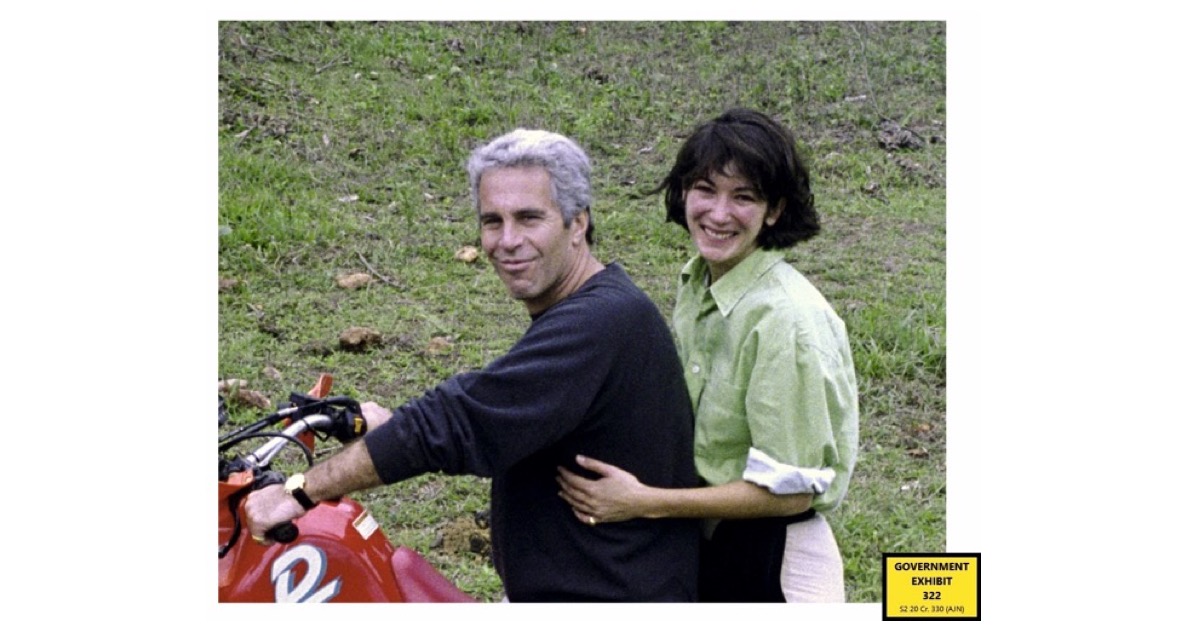
Ghislaine Maxwell sits behind Jeffrey Epstein on a motorcycle. (Photo courtesy DOJ)
Ghislaine Maxwell’s fight for a new trial on the basis of alleged juror misconduct must play out in the public domain, a federal judge ruled on Friday, rejecting the now-convicted Jeffrey Epstein accomplice’s request to keep those motions under seal.
“Any sealing of judicial documents must be narrowly tailored to serve competing interests,” U.S. District Judge Alison Nathan wrote in a seven-page order. “In this case, important interests include preserving the integrity of any inquiry process going forward as well as protecting juror anonymity and privacy. Protection of these interests, however, can plainly be accomplished through tailored redactions.”
Late last year, Maxwell was convicted of sex trafficking and procuring minors for Epstein’s abuse, but she has pinned hopes on a retrial on what followed the jury’s unanimous verdict. One of the jurors, Scotty David, told multiple news outlets that his personal experiences as a survivor of childhood sexual abuse informed his deliberations and those of his peers. Maxwell’s defense team attacked the memories of her victims during cross-examination, and David told the press that his own experiences with traumatic memories taught him not to expect survivors to recount everything perfectly.
“This verdict is for all the victims,” David told The Independent. “For those who testified, for those who came forward and for those who haven’t come forward. I’m glad that Maxwell has been held accountable.”
For Maxwell, the disclosure appeared to be a sign of juror misconduct because they claim David wrote something else entirely on his still-sealed jury questionnaire. Multiple news outlets reported that he checked a box indicating that neither he nor a loved one had been a victim of sexual abuse. Jury questionnaires are sworn under penalty of perjury, and David has retained a lawyer.
If Judge Nathan decides to hold a judicial inquiry into the matter, David may be asked to account for any alleged discrepancies between his interviews and his voir dire. Maxwell’s defense team wanted to keep all arguments under seal to avoid tipping him off to what sort of additional testimony by him could compromise his verdict or potentially leave him exposed.
“The Court agrees that the integrity of any inquiry is a ‘higher value’ that must be weighed in determining public access to the documents,” the ruling states.
However, Nathan noted, the public also has a right to know.
“Wholesale sealing of the motion papers, even on a temporary basis, is not narrowly tailored to serve the interest in ensuring the integrity of any potential inquiry,” she wrote. “The Court is unpersuaded by the Defendant’s concern that media interest in the motion warrants temporary sealing of the documents in their entirety.”
Despite granting interviews to The Independent, The Daily Mail, and Reuters, Scotty David’s name remains shielded in court papers as “Juror 50,” and his attorney filed a motion to intervene in the previously secret squabble.
Judge Nathan summarily rejected that request.
“Although cases do support that a juror should have legal counsel in a post-verdict inquiry into allegedly false voir dire responses, as Juror 50 does have, no cases support intervention,” she wrote.
Maxwell’s attorney Bobbi Sternheim did not immediately respond to an email requesting comment.
Read the ruling, below: